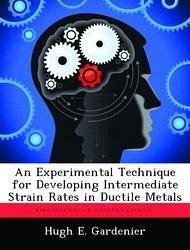Quantifying the strain-rate sensitive dynamic properties of structural materials is an important area of research in the solid mechanics field. Property evaluation is typically accomplished using dynamic tests which involve rapid loading or impact of specimens. In these tests, inertial forces and wave propagation make it difficult to accurately record the material response to a loading condition at an equivalent location. Furthermore, these tests typically generate high strain rates (in excess of 10 3 s - 1 and an experimental method for generating rates of strain in the intermediate strain rate regime which is relatively simple, low cost, and reliable is still lacking. This research effort develops an experimental technique for generating tensile plastic strain rates up to 10 2 s -1 in ductile metals. The technique relies on an impact from a load cell instrumented drop weight machine capable of delivering a suitable impact velocity and energy to globally deform a slotted beam specimen. At impact, a state of plastic uniaxial tensile stress is created in the ligament underneath a slot. The ligament is instrumented with an electrical-resistance strain gauge, and the strain history from the gauge is measured and stored in a digital oscilloscope. The Johnson-Cook constitutive equation is assumed to reflect the material behavior and its parameters are determined through a matching of the experimental strain history with a finite element simulation.
Hinweis: Dieser Artikel kann nur an eine deutsche Lieferadresse ausgeliefert werden.
Hinweis: Dieser Artikel kann nur an eine deutsche Lieferadresse ausgeliefert werden.



![The Psychology of Learning [electronic Resource]: an Experimental Investigation of the Economy and Technique of Memory The Psychology of Learning [electronic Resource]: an Experimental Investigation of the Economy and Technique of Memory](https://bilder.buecher.de/produkte/65/65487/65487305m.jpg)




